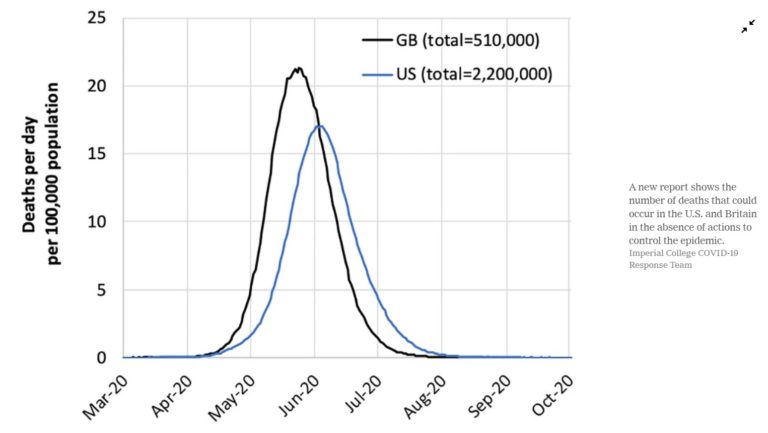The “Italian model” for fighting the coronavirus is a simple three-step plan based on scientific evidence and the experience of China: (1) slow down the spread of the virus with quarantine measures locking down the economy; (2) during the lockdown, ramp up medical facilities to treat as many virus victims as possible; and (3) put together an aid package to address the pandemic-induced economic crisis. Many countries have been hesitant to adopt the Italian model and reportedly President Trump, who had been downplaying COVID-19 for weeks, changed his mind when he saw a report from Imperial College (London) warning, inter alia, that without action by the government and individuals to slow the spread of the virus, 2.2 million people in the United States could die. And half-a-million in the U.K.:
To date, Trump is still not following the Italian model to address the pandemic and save lives. Concerned that COVID-19 will sink the economy, he is offering trillions of dollars to shower the country with helicopter money and economic aid packages. But there’s nothing for the 44 million uninsured Americans and another 38 million who have only partial access to medical facilities. In short, Trump, having upended Obamacare and cut back on Federal health services and research, leaves the U.S. woefully unprepared to address the COVID-19 emergency.
Mismanagement of this public health emergency is however not limited to the US and Europe has faults of its own, as highlighted in this article on Impakter Italia, our sister publication. On a more hopeful note: in spite of a vertiginous daily peak in deaths in Italy (475 victims on 18 March), the overall number of people infected is rising at a decelerating rate, with “only” + 9.2% in Lombardy, the region which is the epicenter of the health crisis in Italy, as against 20% less than a week ago. This means the lockdown policy is starting to work. (Editor’s note)
The Italian model is gathering consensus from all over Europe, which has so far proceeded in scattered order over how to contain Covid-19. Here are some examples of public health “mismanagement”.
More and more EU countries are adopting the Italian model
Across Europe these days we have witnessed and are witnessing scenes of real madness about the coronavirus emergency. Wild gatherings, four days for the result of a test, crowds who “smurf” the virus, people who escape from quarantine to go skiing secretly.
Italy this time moved ahead of the others. Now, however, other European states are also taking the path traced by our country. But let’s see what acts of irresponsibility have emerged in these dramatic pandemic days.
Europe moving forward in no particular order:
Take Norway as an example. From a direct source, Impakter Italia learned of a Norwegian citizen who has lived in Italy for years and who returned home more than a month ago, at a time when it was still allowed. He suddenly became ill, with, among the symptoms, high fever followed by breathing difficulties. He was hospitalized and tested for coronavirus. The test was carried out last Wednesday, but the outcome only arrived yesterday. Fortunately, he tested negative.
Four days of waiting. But not only that. In the meantime, he was accommodated in the ward without being put in solitary confinement. To the extent that one evening for dinner he was able to order a pizza, which was delivered to the hospital.
It does not matter how representative this case may or may not be for the situation in Norway. However, it is not difficult to imagine how a single case like this could have had devastating consequences.
In France, however, before the late reaction of Macron, the seriousness of the threat was long denied. A few days ago a crowd of cosplayers dressed as Smurfs – fictional, blue gnome-like cartoon characters – marched united with the cry of “let’s smurf the virus”:
Then it was the turn of the yellow vests and finally the first round of local elections on Sunday, March 15. The latter, though abstention was extensive, still amounted to yet another great mass gathering. A situation that could very easily adversely impact the lockout on public places and schools that France has recently decided to apply in the wake of the Italian experience.
In the U.K., however, Boris Johnson has warned the subjects of His Majesty to get used to dying and to see loved ones die. It is useless to try to stop the spread of the infection. The “most fragile and weakest” must, therefore, accept that 60% of the population will fall ill in order to create flock immunity, that is, mass immunization. But for this to happen, they, the frail and weak, must resign themselves to sacrifice.
And even here in Italy, although fun times have ended earlier than in other countries, there are still examples of irresponsibility. Even today we see gatherings in parks, in squares, in various meeting places.
Law enforcement officers tracked down over 20,000 people who circulated without “proven need”, as required by the new government decree. While these are certainly not numerous in a country of 60 million people, they do indicate a certain unwillingness to connect with reality and with a sense of duty.
Article and images from Impakter Italia
Featured image: Milan, 8 February 2020 – Civil protection volunteers engaged in health checks at Milan Malpensa airport (medical officer from Order of Malta) Source: Italian Department of Civil Protection










